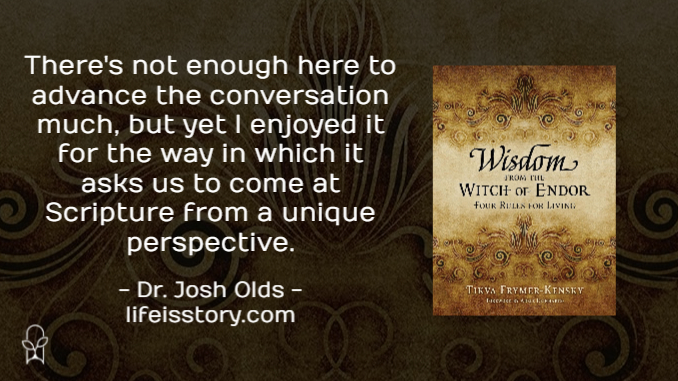
Published by Eerdmans on January 30, 2024
Genres: Non-Fiction, Theology
Buy on Amazon
Goodreads

Four simple rules, amazing results—how wisdom from an overlooked biblical hero can change your life!
Tikva Frymer-Kensky shows readers how a seemingly minor story in the first book of Samuel can teach them key lessons to dramatically improve their lives. Saul, abandoned by God, approaches a medium in the village of Endor to call up the spirit of Samuel. Though Saul had outlawed her craft, she helped him when he promised her safety. And after Samuel prophesied Saul’s death, she showed the shaken king hospitality.
Determination. Excellence. Caution. Benevolence. Four qualities of the “witch” of Endor will bring you success, even when the whole world stands against you. Are you ready to follow your dreams? To succeed when others tell you to give up? Embrace the wisdom of a little-known hero from the Bible—and see how it leads you to the life you were meant to live.
Wisdom from the witch of Endor? Growing up in a conservative denomination, the story of Saul consulting a witch in order to get the advice of a dead Samuel was—well, it was never really spoken about at all in churches. Evangelical commentaries, however, universally condemn the unnamed witch. NICOT says that this story “teaches us how futile it is to call upon the practice of necromancy.” NAC reads that Saul’s actions indicate “a willingness to sin against the Lord.” And I could go on. But Tikva Frymer-Kensky offers a subversive reading: “The biblical story of the witch of Endor demonstrates the strengths that enable her to survive and thrive despite hard times in a hostile society.”
Wisdom from the Witch of Endor: Four Rules for Living is a pocket-sized devotional reflection on a unique biblical character taken from a perspective we don’t often consider. For me, it was important that Frymer-Kensky establish a reasonable foundation for calling the witch a biblical hero. She does this in her first chapter by saying that the Old Testament prohibition of witchcraft applied only to makashefah (sorceresses). The “witch of Endor” is something different entirely—someone who uses an ob to communicate with the dead. But to Frymer-Kensky, the title, vocation, or even the legitimacy of the witch’s work and its morality are of no concern. Rather, she’s primarily concerned with how this woman speaks truth to power.
The four lessons that Wisdom from the Witch of Endor offers is 1) Know Your Power, 2) Strive to Excel, 3) Choose the Moment, and 4) Win Well. Tikva Frymer-Kensky outlines each of these in short ten-page chapters—just over 1,000 words. She draws out modern applications for each of these lessons, presenting the witch of Endor as an oppressed and marginalized figure quietly defying systems of empire.
The brief nature of the book—more of a booklet, really—keeps Frymer-Kensky from going into much detail or using the witch of Endor as much more than a shocking jumping-off point. Her four lessons are valid but their connection to the witch is rather vague and shaky. Perhaps in a fuller treatise, she could have won me over. Perhaps with more specific lessons, I would have seen the necessity in using the witch of Endor as the figure necessary to exemplify these lessons. But the blogpost-length chapters and simple applications make this feel more like just an attempt to use a controversial figure to create conversation.
Frymer-Kensky died in 2006 and Wisdom from the Witch of Endor was found amongst her papers. What was her goal for this writing? Was it a completed work? Was it meant to be expanded upon? To whom was she writing? What was the work’s context? To me, the book reads like preliminary musings—the start of something that never got finished. The argument to look at the witch of Endor more positively is compelling, but incomplete. The lessons that can be learned feel both very vague and broad but her applications are very contextual and specific. This book feels more like notes written as an example of how we can interpret and apply Scripture, like a conversation where we are meant to engage with it and challenge it. Perhaps it could be most completely defined as a midrash, echoing the way Jewish rabbis contemplating Scriptural stories.
In the end, I’m glad to have read it but I wish it had been something more. The lessons to be learned are broad. The arguments for viewing the witch of Endor positively are interesting but incomplete. There’s just not enough here to really advance the conversation much. Yet, I enjoyed it for the way in which it was subversive and asks us to come at Scripture from a unique perspective. I would love to see this handled in a full book-length volume.
